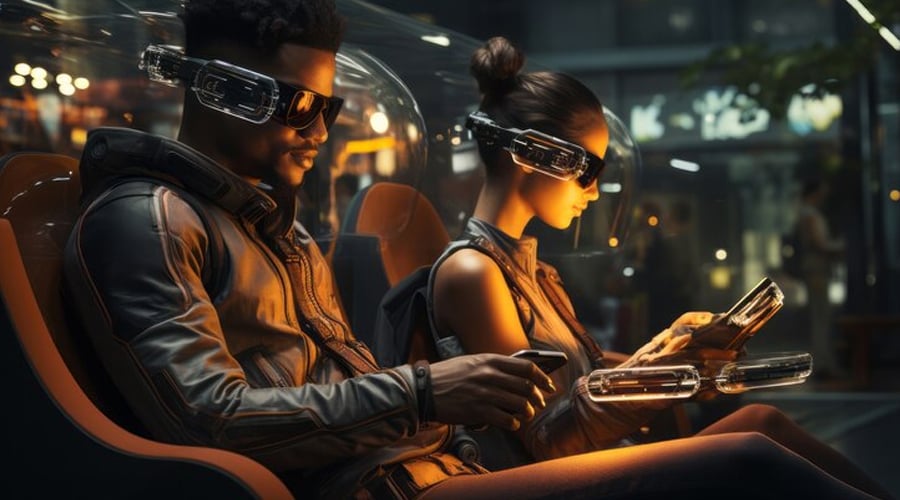
Artificial intelligence technologies have been used in the video games development process for years, but the emergence of generative AI will be a “game-changer” that can potentially revolutionize how they’re made.
Traditionally, AI has been used by game developers to create new environments in immersive gaming worlds, and to generate in-game behaviors for non-playable characters. But the creative force of generative AI unleashes a number of new use cases that go far beyond these elements.
How Generative AI Aids Game Development
To understand the implications of generative AI on video game development, we need to consider the various elements involved in the process of creating new games, and see how the technology can improve the way these processes are done.
One of the first steps in creating a new video game is the creation of the gaming world. Generative AI can aid in the creation of realistic looking virtual terrain and worlds, doing it not only faster but also in a way that enhances the visual appeal of virtual worlds.
The technology can also aid with procedural generation for gaming engines, creating vast, intricate and unpredictable environments with enhanced randomization, ensuring a unique experience during each gameplay session. In addition, it has the potential to streamline 3D model and character creation, reducing the time it takes to design and bring to life realistic and intelligent in-game characters.
Generative AI has the ability to synthesize human voices, which potentially means more diverse and realistic voiceovers for the characters in video games. It can also translate these voices into numerous different languages, enabling the same experience for users all over the world.
Ambient soundscapes and music can also be created entirely using generative AI, with dynamic adjustments that change based on in-game events enhancing the emotional impact for gamers. Similarly, the technology can recreate more realistic sound effects, adding to the immersion of games.
Another use of generative AI is dialogue generation, with the technology helping to write more realistic and diverse dialogues that change every time the user interacts with an in-game character. It can also be used to support greater character consistency to enrich the storytelling aspect of games.
Finally, generative AI can aid in more dynamic storytelling, creating non-linear storylines that evolve based on the player’s choices. In this way, every single game will be a unique and personalized experience.
Assassin’s Creed developer Jade Raymond has said that the adoption of generative AI in big-budget games as the technology will dramatically speed up the pace of game development while cutting costs for game studios.
Testing Video Games
In addition to the creative aspects of generative AI, the technology helps enhance processes such as bug fixing, quality assurance and in-game testing. For instance, it can automatically detect defects in games, ranking them based on the impact they have on the gameplay. With its predictive capabilities, generative AI can analyze data to predict possible issues that may arise in new games, giving developers the opportunity to fix them proactively.
Using generative AI, developers can even create multiple bots – simulated players – to test the gameplay, with each one programmed to play the game differently. In this way, the technology can help developers identify areas where gamers may get stuck, or parts of the game that are too easy to complete. Using these insights, they can then create more satisfying game experiences.
Finally, it may aid in revenue generation, as it can identify the factors that compel human players to spend money on in-game accessories or weapons to help them progress.
Real-World Impact
Generative AI in games development is already making its mark. One notable example is , the Web3 technology provider that built and created more for Star Trek fans, among numerous other projects.
The , a Generative Media Intelligence system that’s able to market-ready in-game assets in a matter of seconds, allows creators to upload images or video content and convert them into intricate and immersive experiences in video games. Previously, such immersive experiences involved the use of time-consuming 3D modeling technologies, and would take weeks or months to create.
In a showcase of the dropp platform, droppGroup demonstrated its efficiency by creating a “Cultural Universe ” for Saudi Arabia’s Ministry of Culture. It’s the world’s first government-operated national metaverse, powered by dropp’s innovative AI system.
The Cultural Universe is essentially a digital twin that showcases Saudi Arabia’s rich heritage and contemporary cultural events, and represents a concrete manifestation of the country’s ambitions to drive technological advancement and cultural preservation. dropp’s pivotal role in uniting cutting-edge technologies and cultural narratives illustrates its dedicated towards building bridges in the digital era.
, the metaverse avatar creation platform, is using generative AI to speed up character creation. It recently launched its in beta, giving metaverse users the chance to design their own clothing for their virtual world avatars.
Some developers are harnessing generative AI models to improve the more traditional AI models used in games development. AI has actually long been used in video games, powering the behavior of non-playable characters (NPCs) for instance, and a company called says it’s using generative AI to enable them to respond in a more realistic way, based on what the user says. The company recently showcased this capability by creating a that responds to children based on what they tell him they want for Christmas.
Meanwhile, the Chinese games developer NetEase has announced it will use ChatGPT to power in the mobile version of its popular massively multiplayer online game, Justice Online.
Another example is Ninja Theory, which is said to be using generative AI to for in-game characters. Its models are said to leverage the open-source Altered AI voice library.
Then there’s Ubisoft, creator of the Ghost Recon and Assassin’s Creed franchises, which has built a tool called Ghostwriter to or brief phrases uttered by its NPCs when they are triggered to do so by events in the gameplay. With this technology, Ubisoft says it’s aiming to create drafts for in-game character dialogues, which will then be chosen and polished by human scriptwriters.
A Valuable Tool For Games Creators
It’s far from certain that generative AI will fully replace the human artistry, creativity, imagination and ingenuity required to develop blockbuster games, but the technology is already making its mark in the industry in numerous ways. Generative AI can dramatically reduce the costs involved in games development while speeding up and enhancing the creative aspects, and these unique capabilities will ensure it becomes an invaluable tool for almost every video game publisher in future.









